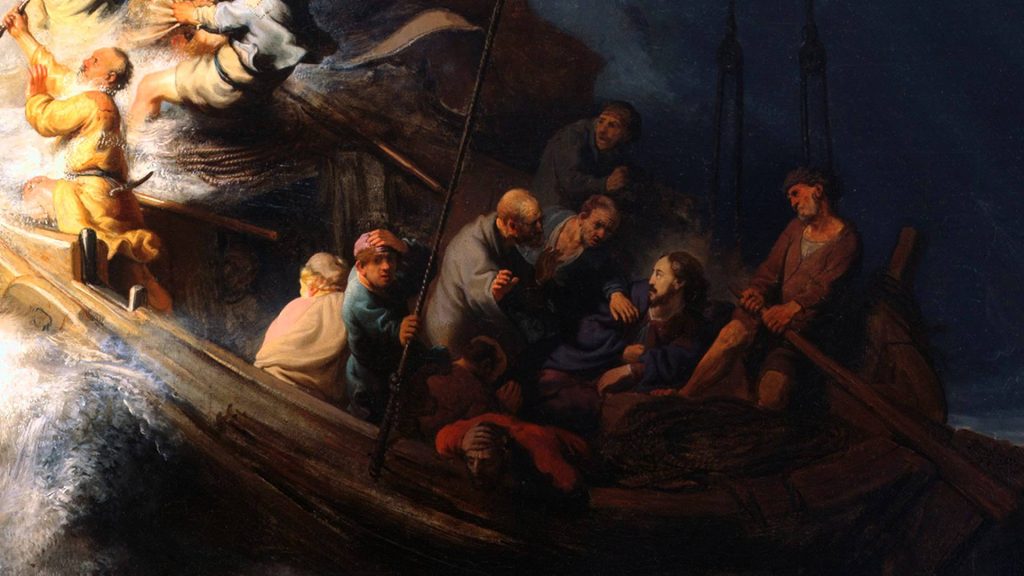
Mass readings for the 12th Sunday in Ordinary Time:
Job 38.1-4, 8-11 Psalm 107.23-26, 28-31 2 Corinthians 5.14-17 Mark 4.35-41
We live in stormy times. A lot of the turbulence is caused by, and I know you’ve heard me say this before, really bad ideas. And one really bad idea is to privilege emotion over reason both in our personal lives, but more dangerously in the public sphere.
The human soul, the mind, however you want to understand our interior lives as human beings, is roiled by emotion; particularly fear, but we have mixed in there a lot of others. When we think about the deadly sins, these correspond to emotional states: anger and jealousy being obvious examples. However, the virtues do as well have this correspondence, but they express a control over our emotions. For example, courage is a virtue that controls fear, temperance moderates our feelings of anger and envy.
When we fail to control interior lives, a storm rages within us; if as a society we cease to instruct and encourage people in virtues, we soon see these little individual storms collect into hurricanes of emotionally driven destruction as we saw last summer; as we continue to see today with acts of historical vandalism and retribution that grow out of humanity’s legacy of mutual injury and abuse.
The great ark that is the Church is today caught in this gathering storm and in recent months, when we were not able to gather as a community, we felt keenly our isolation, alone or in our small household groups of two, three, four or more. Each little domestic church, a modest vessel floating on the chaos of modern life. The inability to gather, to recognize that we aren’t alone by seeing the physical reality of a hundred or more souls gathered to confess the faith, receive the sacraments, offer thanksgiving, this over time can make us seem so vulnerable, to give rise to the fear that we are indeed perishing and that God doesn’t care.
We need to remember that God is always in the boat with us. Whether it is here in this church, a great galley with you all there seated as like rowers pulling on oars to propel us all through the sea of life; or when alone, a solo sailor upon the waters – Christ is there, and we need to awaken him when the storm clouds gather.
And when awakened what does he bring? Yes, in the story, after rebuking the disciples for their lack of faith, he goes to the bow, raises his arms and commands the sea and sky to quieten and become calm, but I’d argue there is in this a powerful teaching that comes through metaphor. There is a greater message here than a tale of a maritime rescue.
Again, I’ve spoken of this before, how Christ as God incarnate manifests the Logos of God. When we read the opening of John’s gospel, we see that Jesus is described as “the Word made flesh”; and that in Greek, “word” is translated as logos which is something greater than merely a written word or sign which is semeion.
Logos implies the reasoning mind behind the utterance, the sign, the message. We get the word logic from logos, so I hope you see that connection. So, Jesus Christ is the incarnation of Divine Reason, he manifests in the flesh the rationality of God. And this is not a cold logic, an impersonal reason, but the peace of God that calms the soul to proper understanding of our common fallen state, our universal need for reconciliation in God through Christ, and then shows us what to do in the present.
When we recall to ourselves his presence in our lives, when we call upon him to calm the inner turmoil, we are asking for reason to take the helm of our ship, grasp the tiller of our little boat, to bring a halt to the panic and put our minds and souls back on course.

But that’s not always easy to do. It’s something we learn from our Lord, sitting patiently at his feet, listening to his words, following his example.
To return to this privileging of emotion over reason, we need to understand that this comes from the ideological capture of our elites in the cultural industries, in the judicial system, in corporate business, in government and academia, captured by woke ideology, critical race theory. A very important idea in critical race theory, or “CRT” is the concept of “lived experience.”
It’s important to know that CRT started as a school of thought in studies of western legal systems, and rightly saw that many are disadvantaged in our law courts. So, for example, someone who grows up in a North American city in poverty, in a crime-ridden district, with physical, emotional, sexual abuse in the home, with an absent father, a drug-addicted mother, etc., there is good reason to evaluate the criminal activity of such a person differently from what we refer to as a “white-collar” criminal. That lived experience of deprivation, ignorance and violence needs to be understood and factored in to what we are going to do with an offender; so, it’s important to hear what he has to say about his life.
When you take that concept, however, and translate it into analyses of groups, communities, it begins to become a problem in itself; it’s tool that initially looks promising, but is not suited to the job.
“Lived experience” is inherently subjective; it’s one point of view among others. There is also objective reality; and reality is very complex, and impossible to know completely. We need humility when we dare to make pronouncements about “what really happened.” Most of history, most of life does not fit into the narrative we see being propagated today—of history as simply a cycle of oppression and violence, victimization and cruelty. We see this when those involved in residential schools are not too subtly compared to concentration camp guards; when the improvised cemeteries at the schools, created because the government would not pay to send home the bodies of children who had died of tuberculosis, scarlet fever and any other number of common diseases of that era. Their teachers, many of whom lived in poverty themselves, did the best they could, and gave them the dignity of burial, and likely a simple wooden marker that has long-since vanished. It is slanderous to call these places “mass graves” as if created following a massacre.
This does not help us heal and reconcile over the tragedy of the misbegotten policy of compulsory residential schools for indigenous children. But there is a perverse emotional satisfaction to be found in characterizing history this way, and of course, putting oneself on the side of the innocents.
What is worrying is that aside from this very serious and substantial issue of the schools, we see “lived experience” being brought to bear in such a way as to magnify the trivial, and create evermore irritation among the many communities and groups that must co-exist for our society to function, let alone flourish.
The popular expression of the “lived experience” concept comes in what we know as “triggering” – people becoming upset when they see a sign, a statue, a flag, whatever based on how their identity is somehow threatened by its presence. The emotional upset becomes the basis for banning whatever it is that offended. In the meantime, those not offended, who look at that sign, symbol, statue, what have you, with either ambivalence, or with some sense of attachment, are now offended by what looks like an arbitrary attack upon their heritage, their beliefs; but in this instance, their “lived experience” doesn’t count. It all becomes very socially divisive.
As a Church, as Christians, we must refuse to play this game; to be contestants in the claim to greater victimhood or conversely, deniers of humanity’s tragic history. We must be champions of Christ’s reconciliation through forgiveness and healing, and bringing to the world a humility that acknowledges that we have all sinned and fallen short of the glory of God.
We see in today’s gospel passage the precarious state of the “the Jesus movement”. I call it a movement because during the time of Jesus’ ministry on Earth, we really can’t speak of there being a Church, any kind of institution that even remotely resembles the ancient Church let alone what we have today. Simply, there was Jesus, and his followers; and an emerging leadership that we know, certainly from today’s gospel story, was not ready to lead.
There was a heavy psychological and spiritual dependence on Jesus being physically present to his followers. Without him at the head of the parade, as it were, this movement would dissolve into a rabble, disperse in confusion.
And that’s pretty much what the authorities in Jerusalem, both the Romans and those of the Temple, counted on when it came time to deal with the troublesome carpenter from Nazareth and his disciples who were growing in number to a worrying degree—cut off the head, and the body will die instantly.
They believed that to be the case, but so too did the disciples! Jesus falling asleep in the midst of the crisis at sea has them despairing. It is in indication of the shallowness of their faith, the incomplete understanding they have of the gospel.
It is reflective of basic human psychology that we find comfort in groups. We like to have lots of people who share with us a common identity, a set of beliefs; and we like strong leadership, especially in times of crisis. Yet as Christians, because our community is spiritual as well as material; that our communion through Christ transcends space and time, we have no particular need of a mob chanting slogans and shaking fists to be resolved in our beliefs.
Think about the lonely martyrs in the Roman arenas, cast amidst wild beasts, or stood upon scaffolds for public executions for their faith, the mob in the stands shouting insults, heckling, taunting, just like the crowd that gathered along the way to Golgotha. We have that great cloud of witnesses ever above us, angels attending with silent words of encouragement. We don’t need commercial brands to sport our colours, multinational corporations to pander to us with hollow pledges of allegiance to our creed. I don’t need the NBA to defend Christ the way they rationalized the crimes of the Communist leadership in China; or some late-night comedian on television to parrot church doctrine as they do the tenets of political correctness and mock those who disagree.

We have all that we need. Christ our captain is ever present: there he sits enthroned in the tabernacle, and in our communion both through the blessed sacrament, and in our constant prayer, he enters into us in a very real way so to make a home in us, to be always present and ever awake in us.
Amen.